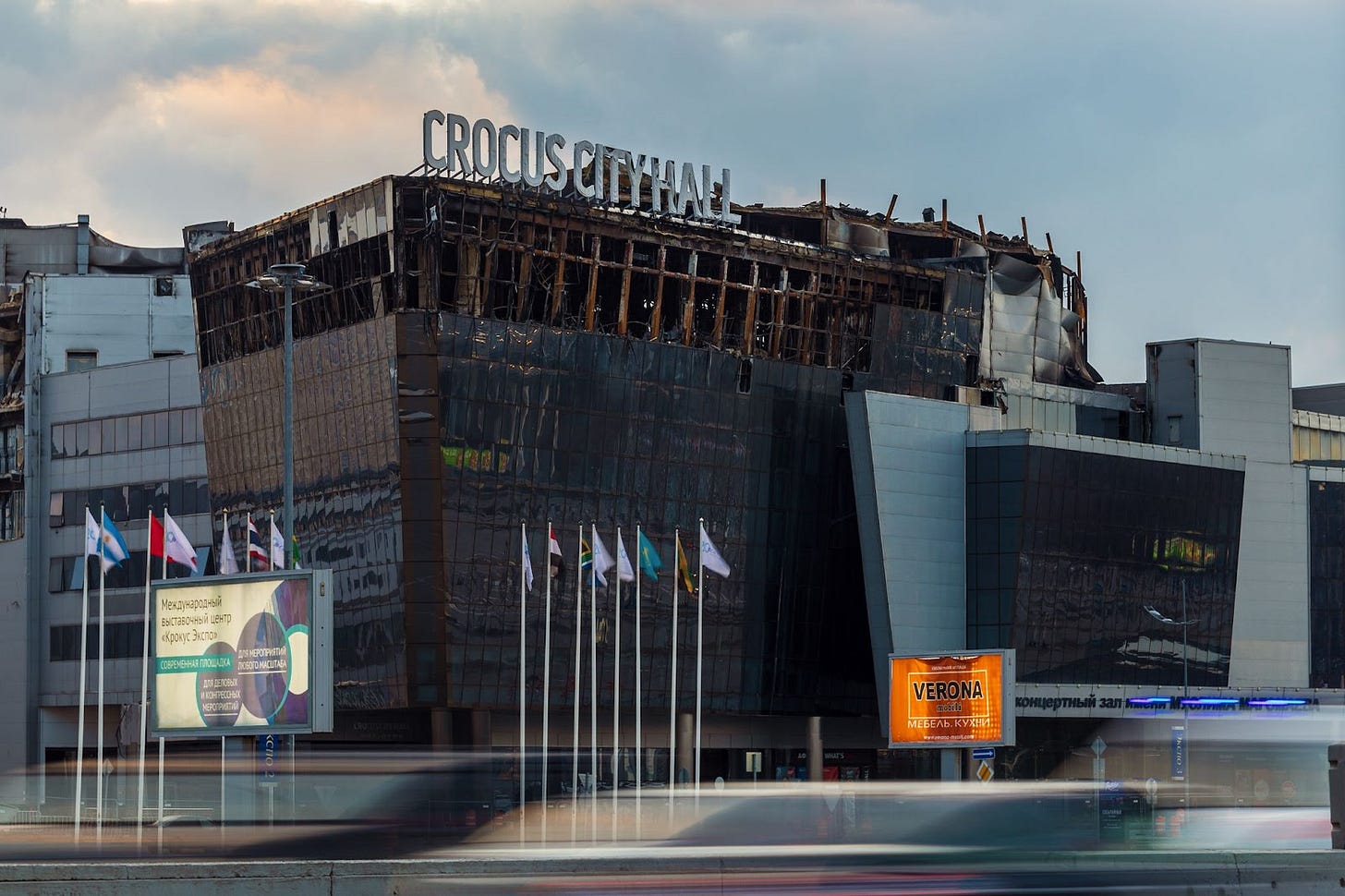The Moscow Storm
Originally Published in May 2024
On March 22, 2024, a terrorist attack at the Crocus City Hall music venue in Krasnogorsk, Russia left 143 people dead and over 550 injured. ISIS quickly claimed responsibility for this attack.
Video footage showed four gunmen storm the venue and fire at 6,000 people who were attending a rock concert. The attackers set fires which engulfed the venue and caused the roof to collapse. As the attack unfolded, the crowd took shelter behind cushioned seats as gunshots echoed through the vast hall.
Russian authorities deployed a SWAT team and medical logistics to critical sites, but it took more than an hour for them to get in position because of local traffic jams. Some Russians accused the government of the slow emergency response to this attack and blamed insufficient security.
“Where are the helicopters for speedy deployment to critical sites in the metropolitan conditions of Moscow? Where are the armed vehicles?” Said Nikolay Mitrokhin, a research fellow at the University of Bremen. He added that this attack revealed the impotence of Russia’s security services and the entire law enforcement system.
“For over a decade, Russian intelligence forces have not protected the Russian people against internal and external threats but protected the government from people. That’s their only duty,” said a Georgetown student from Russia, speaking on the condition of anonymity. “It is very possible that the security service didn’t prevent the attack on purpose, and waited for casualties to push the agenda in the moments of struggle in Ukraine. Russia has a history of implementing the strategy of false flags since 1999. With this strategy, the Kremlin can justify their ongoing invasion of Ukraine.”
On March 23, the head of the Federal Security Service (FSB), Alexander Bortnikov, reported to Putin that the agency detained 11 people, including four gunmen, who are linked to the attack. Three days after the tragedy, President Vladimir Putin gave a televised speech, insisting that Ukraine was behind this attack. Nikolai Patrushev, secretary of the Russian security council, and Alexander Bortnikov, the head of the FSB also claimed that the four alleged terrorists had confirmed the “Ukrainian trail” during interrogation. Ukrainian President Volodymyr Zelensky denied any involvement in the attack and responded that the Kremlin frequently deflects blame onto its political enemies.
Weeks before the attack, the U.S. warned the Kremlin that suspicious extremists gathered in Moscow and were determined to target certain areas of national importance. The US embassy in Russia warned its citizens to avoid such spaces. The Central Intelligence Agency also delivered another warning message to the Kremlin on March 7. The Russian government disregarded the warning, considering it an attempt to destabilize Russian society. According to the Russian Spy Chief Sergei Naryshkin, America's warning was too general. As a result, the authorities failed to identify and prevent the potential attack.
The Crocus City Hall terrorist attack was the result of a combination of historical grievances and a complex regional geopolitical landscape. ISIS holds deep resentment for Russia due to its historical engagements in the Middle East, most recently in the Syrian Civil War. ISIS also seeks to maintain its global relevance after its 2019 territorial defeat in Iraq and Syria.
ISIS harbors a deep resentment against Russia due to its military collaboration with the Assad regime in Syria. Russian operations in Syria directly impacted ISIS’s operational capabilities and territorial control in the area. ISIS opposes the Assad regime because its political elite adheres to the Alawite sect of Islam — a group that radical Sunni Muslims, including ISIS, consider illegitimate and heretical.
ISIS believes that the Alawites are part of the jahiliyyah, referring to a state of ignorance used to describe societies and governments that do not conform to ISIS’s own interpretation of Islamic law. ISIS views Russia as a primary cause of the Assad regime’s survival after the Syrian Civil War. The most notable terrorist attack that ISIS has committed against a Russian target was the bombing of a Russian passenger plane over the Sinai Peninsula in October 2015, killing all 224 passengers (the majority of whom were Russian tourists.).
Strategically, the commission of a terrorist attack outside of the Middle East is a method for ISIS to demonstrate its continued relevance and capabilities. Such terrorist attacks project power, attract recruits and could secure funding by showcasing an ability to strike at a major global power.
ISIS has claimed responsibility for several attacks in Russia’s Caucasus region in the past. The group actively recruits from Russia and other former Soviet states. This particular attack was likely intended to project a strong image to a global audience while attacking a state that has directly opposed ISIS for a decade.
It is also important to note that ISIS has consolidated its influence in Afghanistan since the Taliban’s power seizure in 2021 through its regional affiliate, ISIS-K. Since retaking power, the Taliban have undertaken significant diplomatic engagements, including with Russia.
ISIS views the Taliban’s engagement with Russia as a betrayal. Thus, it is likely that ISIS views an attack on Russia as a mechanism to demonstrate strength against the Taliban and achieve their political goals within Afghanistan.
The tragic event underscores the complex dynamics behind global terrorism, where historical grudges, strategic objectives, and intricate geopolitical alliances converge, leading to violence that has both local and international ramifications.



